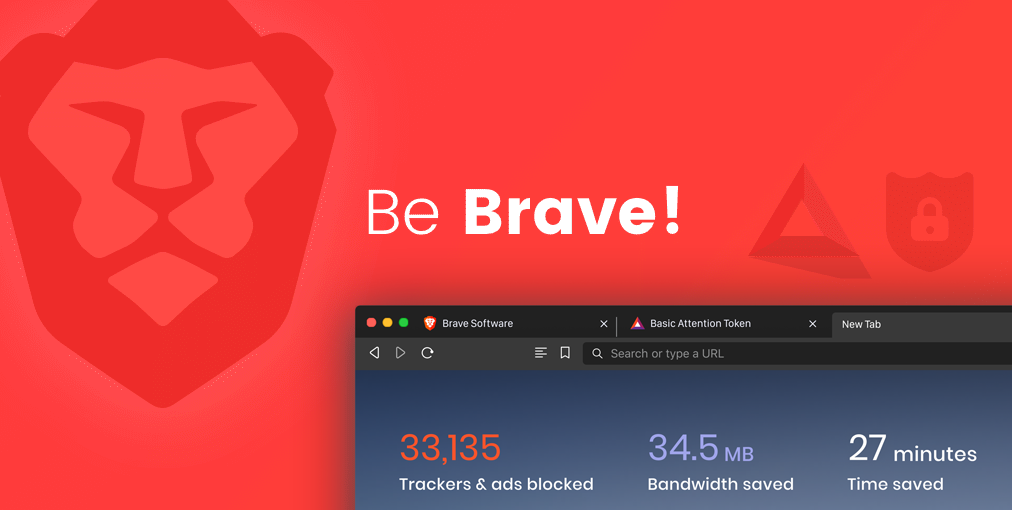The “browser wars” are fiercely fought in online forums and social media. There is a massive outpouring of support from one browser’s users to the opposing camp. This is not a problem exclusive to browsers, but this Brave web browser review has the potential to start a fight.
On the surface, Brave appears to be an excellent browser; it has no user monitoring built into its core and has minimal advertising. More information, such as the browser’s speed, codebase, and add-on compatibility, is revealed as you delve deeper.
The Brave New Web Browser

Brave is the latest in a long series of browsers that aim to compete with industry leaders like Google Chrome. Brian Bondy and Brendan Eich are responsible for making it. Brendan is famous for founding Mozilla and developing JavaScript (the maker of the Firefox browser). Therefore, there is a history of protecting user privacy, which will appeal to computer nerds.
The primary focus of this free and open-source browser is to prevent tracking by advertisers and other websites. In addition, it provides a means through which its cryptocurrency can be sent to third parties, most frequently content providers.
The Mozilla Public License is the cornerstone of Brave’s open-source architecture (MPL). It uses the same open-source license as Firefox and Thunderbird do. Some of the add-ons for Chrome and Firefox are open source, but others, including HTTPS Everywhere and Privacy Badger, use older versions of the GNU General Public License (GPL).
Functions of the Brave Web Browser
According to Engadget, “nearly all of Brave’s hallmark features across all platforms” were included in Brave 1.0, the first version with ad-blocking capabilities. Brave 1.0 may be operated on Android, iOS, Windows 10, macOS, or Linux.
For iOS, Brave provides a system-wide firewall and VPN that works through the browser. The Guardian VPN is utilized. Built into the Brave browser is a wallet client called Brave Wallet, a fork of MetaMask that may be used to sign cryptocurrency transactions on websites that implement the MetaMask application programming interfaces (APIs).
For its part, Brave intends to return 20% of the “router” charge it collects from users by way of BAT tokens. Brave Swap is an aggregator for 0x-based cryptocurrency DEXs; it enables users to trade Ethereum tokens for other tokens directly in the browser. Since April 2019, users of the Brave browser have had the option to participate in Brave Rewards, which gives them BAT in exchange for viewing adverts that don’t compromise their privacy.
Advantages of the Brave Browser
Compared to other browsers, Brave loads pages quickly. In addition to the inherent speed of the Chromium codebase, brave browsers can load significantly less content from a given website by removing trackers and advertisements. Google Chrome and Mozilla Firefox have drawbacks, one of which is the increased load on your computer. Brave uses fewer system resources than Chrome does when numerous tabs are opened.
Brave works with most add-ons designed for the Chromium browser and supports the same core web technologies and standards. By starting with the Chromium source code and then removing all of the privacy-invading Google code, the Brave browser can appear and feel identical to Chrome while providing enhanced protection for the user’s personal information while browsing the web.
Brave browsers can achieve high performance and minimal data consumption by blocking advertisements and the tracking mechanisms used by those advertisements. Brave is twice as quick compared to Chrome and Firefox on desktop computers and compared to Chrome and Safari on mobile devices, it is an astounding eight times as fast. There will be less clutter on each website you visit without intrusive adverts and trackers. As a result, Brave facilitates quicker page loads, longer battery life, and reduce mobile data consumption. As well as features of the Exodus Wallet
Downsides to the Brave Web Browser
Brave’s lack of extensions, add-ons, and plug-ins is its main detriment. While other browsers like Firefox, Chrome, Opera, etc., provide add-ons for seemingly anything imaginable, Brave’s library consists mostly of password managers like Dashlane and LastPass and a few others. Features like ad replacement and the Tor secret browsing tabs are still in “beta” (meaning they aren’t finalized) in the Brave browser, which is still in development. Not all websites are compatible with Brave.
Ad revenue is a significant source of income for most website owners, so readers who use Brave or another ad-blocking browser are giving those outlets a free pass. The widespread adoption of such browsers threatens the financial viability of independent media outlets that rely primarily on advertising revenue. Considering that ad money keeps websites running and allows them to produce content, removing online adverts is unfair.
Conclusion
Brave, the privacy-focused speed demon of a browser that has been making waves with its swaggering attitude to ad-blocking and its promises of cryptocurrency rewards, has finally emerged from its lengthy beta incubation period. With over 8 million users, Brave promises to block trackers and annoying adverts to automatically enhance speed, privacy, and battery life. It was created as an open-source project by Brendan Eich, the author of Javascript and a co-founder of the Mozilla project.

